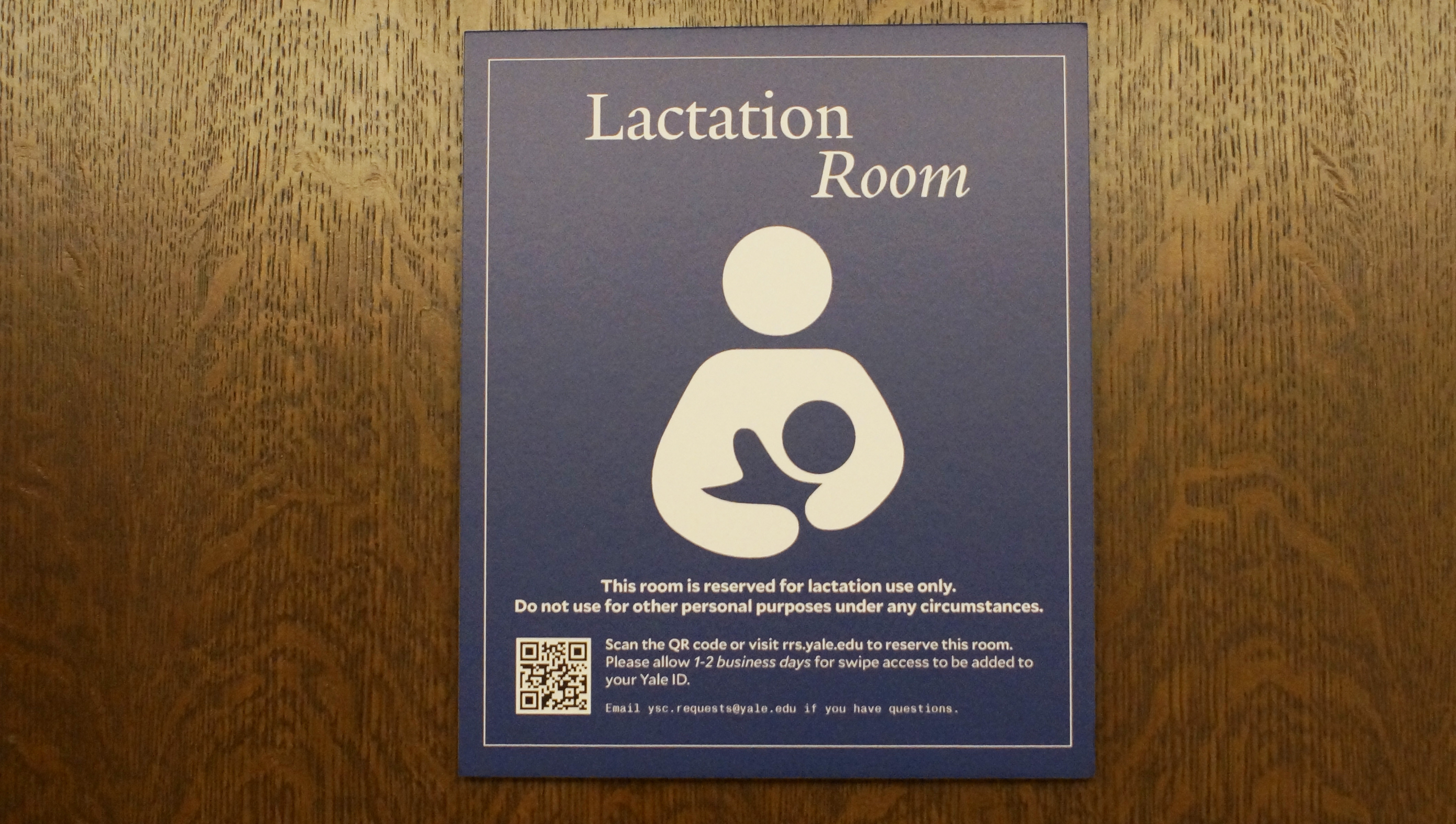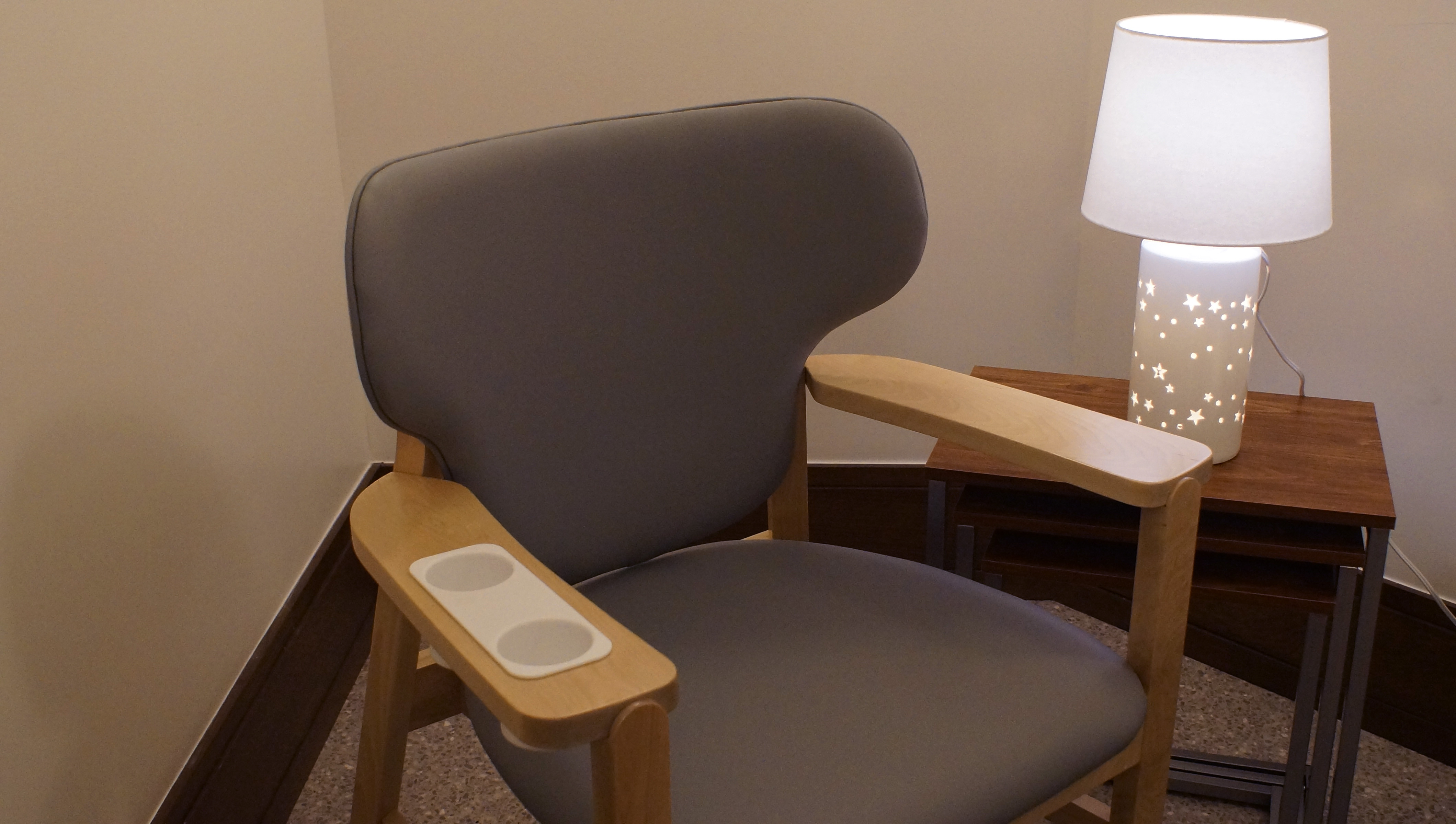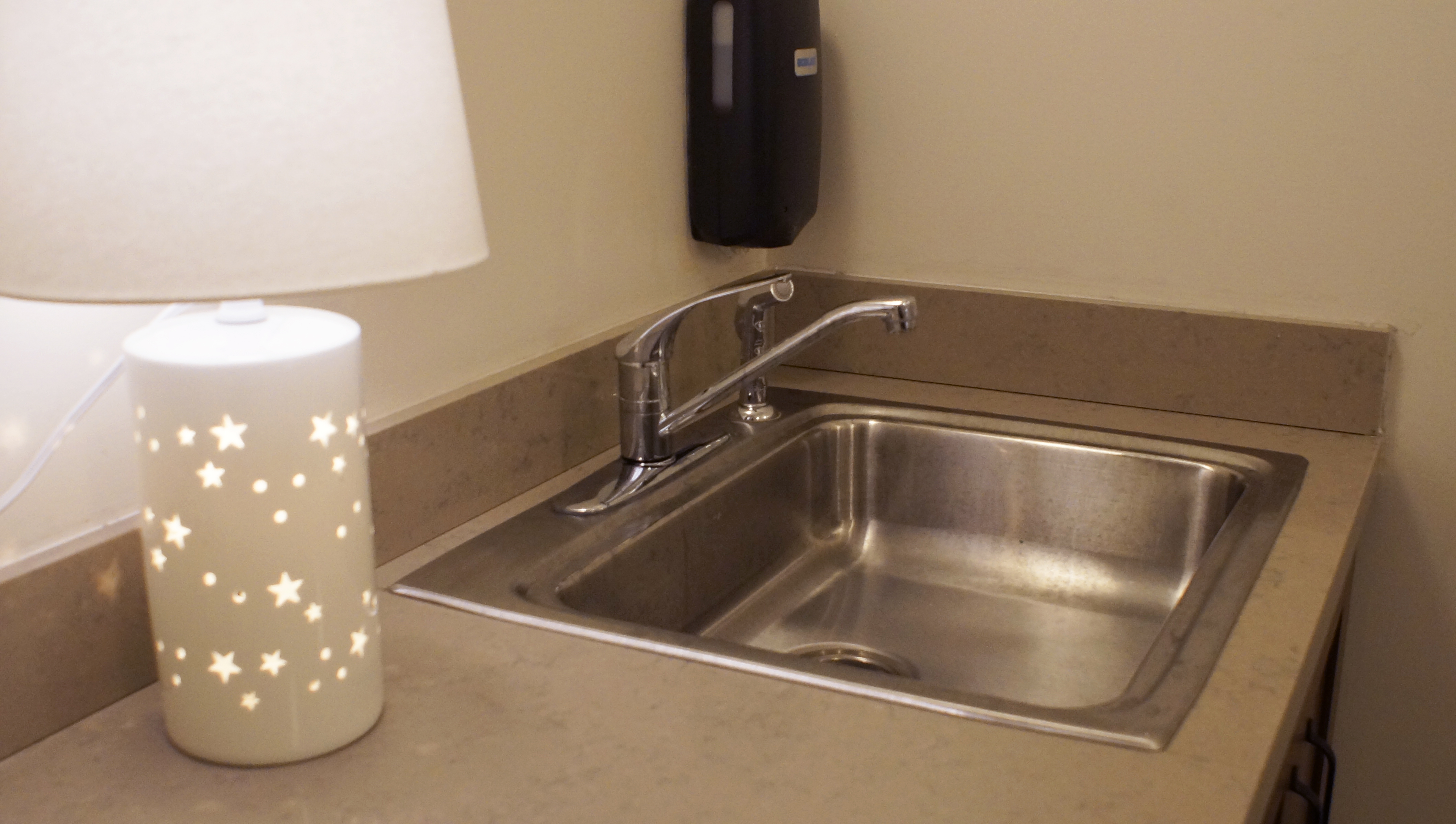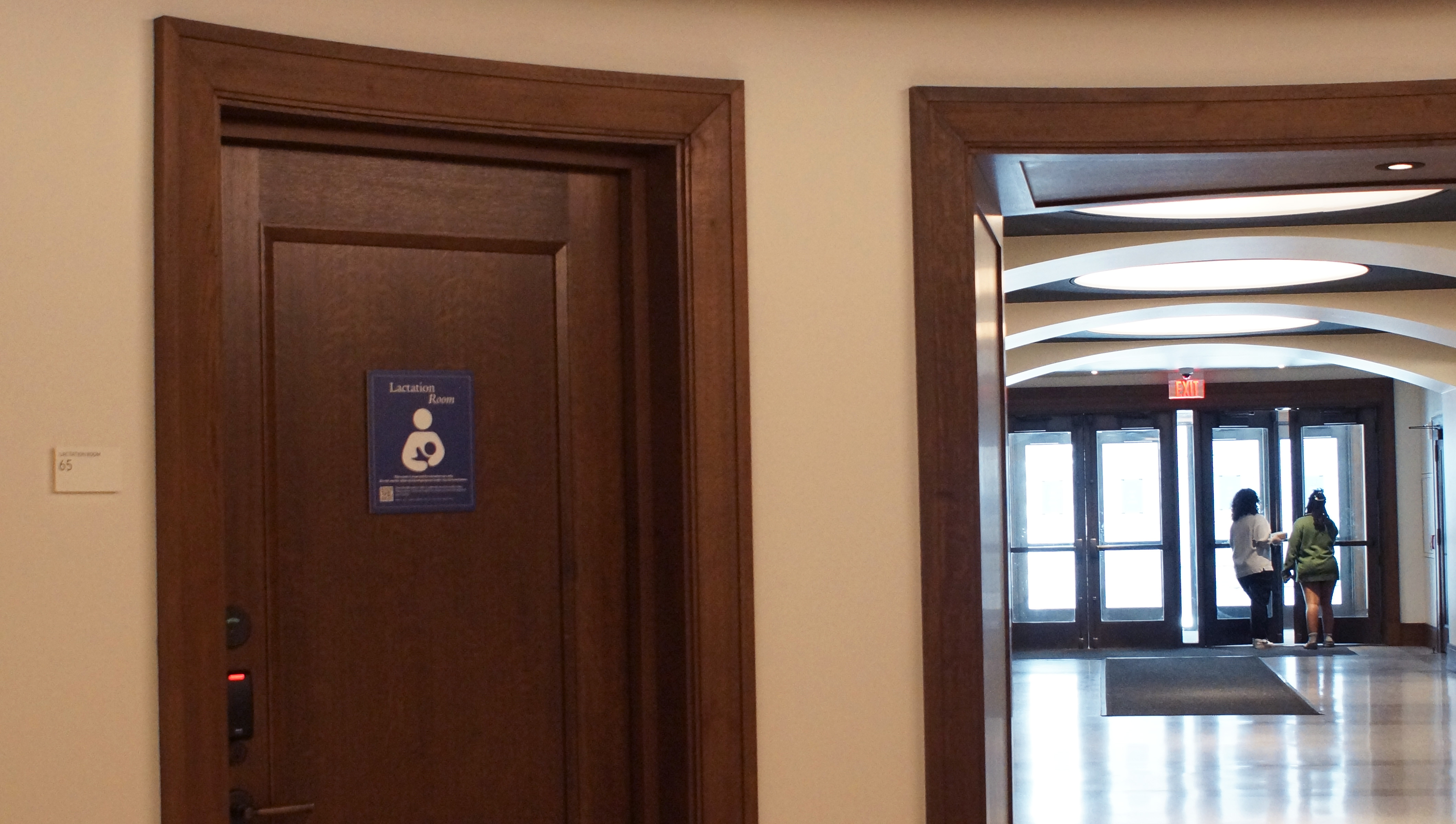Nestled within the chic lower level of the Yale Schwarzman Center—away from the bustle of The Underground, just past the Bow Wow and the Dance Studio—an innovative sanctuary of support for working and studying mothers exists…if you know where to find it. The Center’s lactation room, developed in partnership with Nessel, a leading maker of wellness rooms and lactation furniture, exemplifies the notion of belonging at Yale as a symbol of increasing inclusivity for women navigating the intricate balance between career, study, and motherhood. The defining feature of the Center’s lactation room is its chair, designed under the direction of Nessel co-founders Della Leapman and Stephanie Boms ’07MBA to remedy the maladaptation of the traditional chair that is so often used in spaces borrowed or repurposed for lactation. In lacking ergonomic stability, breast pump security, and general comfort, traditional chairs often fall short of the needs of breastfeeding and lactating individuals. By contrast, Nessel's lactation chair embraces the body, offers ergonomic support, securely attaches to breast-feeding pumps, and reports comparatively simple maintenance and clean up.
Yale Schwarzman Center Creates Innovative Lactation Sanctuary

Photos: Sarah Ficca
I’ve heard so many horror stories of having to breastfeed in closets, cars, train stations, even on the metro.

Nessel CEO Stephanie Boms is not only a distinguished alumna of the Yale School of Management, class of ’07, but also a former leader of the Women in Management Club during her time at Yale. As a working mother herself, Boms intimately understands the myriad of challenges faced during one of the most vulnerable phases in a woman's career, “We all have female coworkers but prior going through [pregnancy & breastfeeding] myself, I never thought about what they were going through...now I’ve heard so many horror stories of having to breastfeed in closets, cars, train stations, even on the metro.” According to Boms, breastfeeding women require at least three 20–30-minute breastfeeding sessions during an 8-hour workday, resulting in a cumulative loss of approximately 1.5 hours of productivity each day. Which over the course of a typical work week results in a full day of productivity lost each week, meaning breastfeeding individuals have only 4 days each week to complete 5 days of work. It's a trying period that forces approximately 43% of highly skilled women to step away from the workforce within six months of giving birth (The Mom Project). But this historical trend does not have to be our present reality. According to Boms, for every $1 invested in lactation spaces, a business nets $2 in savings from improved retention, healthcare cost reduction, and enhanced employee productivity.
...for every $1 invested in lactation spaces, a business nets $2 in savings from improved retention, healthcare cost reduction, and enhanced employee productivity...
Moreover, the importance of private lactation spaces transcends the corporate world. Universities have also recognized the need to prioritize accessibility. Recent legal changes have paved the way for improved access to lactation spaces. The Pump Act, signed into law by President Biden in December of 2022, closes loopholes in the Fair Labor Standards Act, mandating private spaces for breastfeeding mothers in workplaces with over 50 employees. Title IX provides additional coverage for university spaces, recognizing the needs of pregnant and parenting students. The profound significance of these developments cannot be overstated. It's a testament to society's growing awareness of the importance of supporting breastfeeding individuals in their journey to balance career and motherhood. These legal milestones underscore the vital role that private lactation spaces play in the professional and personal lives of people across the nation.
...[it] makes me proud, as well as confident when I want to recruit working mothers who require such a space and when I want to underscore the fact that we're highly supportive of new mothers.

Beyond fulfilling legal obligations, lactation spaces play a crucial role in enhancing public health, these spaces promote a series of beneficial factors. Firstly, lactation rooms provide a private and comfortable space for breastfeeding and pumping, which encourages mothers to breastfeed their infants. This support fosters a myriad of health benefits for both the mother and the child, including a reduced risk of infection, chronic diseases, and improved bonding. Secondly, provision of lactation rooms has been shown to improve employee satisfaction and retention. When working breast feeders have a dedicated space for breastfeeding or pumping, they are more likely to return to work and commit to their employers. This benefits both the health of the breastfeeding individual and the stability of the workforce. Finally, the presence of private lactation rooms in public places, such as shopping centers, airports, and government buildings, make it easier for mothers to breastfeed while on the go. This promotes the continuation of safe, beneficial breastfeeding practices.
As an alumna I’m proud and excited to see the commitment from Yale . . .Yale’s name carries something; this is a key moment for leadership.
To Boms and many others the presence of Nessel's lactation sanctuary within the Yale Schwarzman Center signifies a pivotal moment in the realm of inclusivity. “As an alumna I’m proud and excited to see the commitment from Yale...Yale’s name carries something; this is a key moment for leadership.” Congruently, current leaders like Rachel Fine, executive director at the Yale Schwarzman Center, and a working mother herself, commented that the implementation of the lactation space “makes me proud, as well as confident when I want to recruit working mothers who require such a space and when I want to underscore the fact that we're highly supportive of new mothers. It's a beautiful, peaceful and private space with custom-made furniture for ultimate privacy and comfort. I never had access to such a space following my maternity leaves and that was very unfortunate. It caused a lot of additional stress that I really didn't need as I was learning how to parent.”
When asked about the efficacy of lactation spaces in mitigating such stressors and fostering a sense of community, Rachel expressed that “without question, being a new parent is hard. Often you are sleep-deprived and overwhelmed in learning how to balance new parent responsibilities with professional responsibilities. As a new mother, even knowing that the lactation space is there provides comfort and solace. Its presence also signals to everyone in the community that Yale and the Schwarzman Center care about working mothers and their well-being.”

For me, conversing with these prominent leaders in their respective spaces has shed much light on the institutional necessity of such commitment. Yale’s commitment contributes to a growing recognition that supporting working individuals in their choice to breastfeed and providing the necessary infrastructure to do so comfortably, is an investment in the health and well-being of individuals, communities, and corporations. It's a testament to the power of change, the significance of inclusivity, and the recognition that progressing towards a more equitable future is not only the right thing to do, but the greatest investment an institution can endorse for the generations that follow.

To book lactation rooms at Yale visit rrs.yale.edu
You must have a Yale ID and allow one to two business days for your reservation to be added into the system.